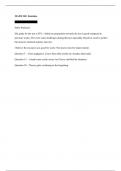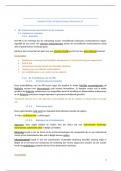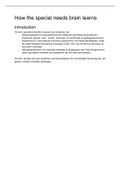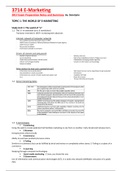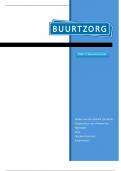Criminal Law T2 Seminar 4
Corporate and vicarious liability –
There are 6 ways in which a prosecution may be brought against a corporation or its
directors.
1–
Personal liability of corporate directors, etc First, individuals within a corporation can be
prosecuted for their personal wrongdoing just as any other human being can. For example,
a managing director of a company who bribes an agent of a company with whom he is
making a contract will be at risk of personal prosecution. So too will a manager who
commits offences of driving carelessly or committing frauds while on company business, etc.
No more need be said about such criminal liability since it is discussed throughout the rest
of the book. If a corporation has been found to be criminally liable, the individual employee
or director, etc can also be liable as a secondary party to the corporation's wrongdoing
under s 8 of the Accessories and Abettors Act 1861. A director can also in some cases be
liable for conspiring with the company. A company can conspire with its directors as long as
there are at least two directors involved in the conspiracy (not both of whom need to be on.
Occasionally, Parliament excludes personal liability when creating corporate offences as.
2-
For offences of strict liability Secondly, in some instances offences of strict or absolute
liability can be committed by a corporation. If no mens rea needs to be proved there is no
difficulty in establishing any fault on the part of the corporation. Depending on which
element of the actus reus attracts strict liability, establishing liability for a corporation will
be no different from a human actor. It is, of course, important in the application of strict
liability to corporations to consider the availability of due diligence defences, allowing the
corporation an opportunity to prove that it took all reasonable steps to avoid the
commission of the offence. No more need be said about this form of liability and the due
diligence defence.
3-
Statutory offences imposing duties on corporations Thirdly, the corporation, as distinct from
its employees or managers, can be criminally liable for any offences laid down by Parliament
as applying specifically to corporations performing the relevant activity. A corporation is a
legal person, but it has no physical existence. As a legal entity, a corporation may be placed
under a duty by Parliament to conduct itself in a particular way on pain of criminal sanction
for non-compliance. For example, Parliament may create an offence for a corporation to
fail to keep records, or to label itself in a particular way. The type of case where it is most
obviously proper that a corporation should be held liable arises where a statute imposes a
duty upon a corporation to act and the corporation breaches that duty by failing to act. It
was in such cases that the earliest developments in corporate liability took place. In 1842, in
Birmingham and Gloucester Rly Co,19 a corporation was convicted for failing to fulfil a
statutory duty. Four years later, in Great North of England Rly Co,20 it was argued that the
effect of that decision was limited to cases of non-feasance where there was no agent who
, could be indicted. It was argued that, in the case of misfeasance, only the agents who had
done the wrongful acts were liable. The court held that the distinction was unfounded. Even
if it were possible to discover which had occurred, it was incongruous that the corporation
should be liable for the one type of wrong and not the other.
4-
It was not a great step forward from holding that a corporation could be liable for breach of
statutory duty, as in Birmingham and Gloucester Railway, to the courts imposing liability
vicariously in these circumstances.Fourthly, then, a corporation can be vicariously liable for
the acts of its employees and agents where a natural person would similarly be liable for
such acts; for example, when a statute imposes vicarious responsibility. Vicarious liability
will be considered in more detail later in this chapter.
5–
Aside from these four categories, prosecuting the corporation within the orthodox model of
criminal law creates difficulties. The fact that the corporation has a legal identity does not
alter the fact that the corporation has no body and mind. The criminal law's solution to the
lack of a corporate body to perform the actus reus and a corporate mind capable of forming
mens rea has been to treat the minds and bodies of the officers and servants of the corpora-
tion as supplying its mental and physical faculties. The fifth way that the corporation can be
liable for offences is therefore on the basis that the controlling officers of the corporation
performed the proscribed conduct with the relevant fault element. This is the so-called
'identification' doctrine. Within every corporation there are certain persons (conveniently
labelled in the Draft Criminal Code as 'controlling officers') who are the 'directing mind and
will' of the corporation and who, when acting in the company's business, are considered to
be the 'embodiment of the company'. Their acts and states of mind are the company's acts
and states of mind and the company is held liable, not for the acts of others, but for what
are deemed to be its own acts. In a corporate prosecution, the court looks to which person
within the organization performed the proscribed conduct and then whether that person is
sufficiently senior to be treated as a person who is a directing mind and will of the company.
A company may in many ways be likened to a human body. It has a brain and a nerve centre
which controls what it does. It also has hands which hold the tools and act in accordance
with directions from the centre. Some of the people in the company are mere servants and
agents who are nothing more than hands to do the work and cannot be said to represent
the mind or will. Others are directors and managers who represent the directing mind and
will of the company and control what it does. The state of mind of these managers is the
state of mind of the company and is treated by the law as such,
In the more recent Meridian case,51 the Privy Council, in a valuable review of the nature of
corporate liability, held that where the criminal liability alleged is under a statutory offence,
whether conduct is to be attributed to a corporation is a question of the construction of the
particular statute under which proceedings are brought. Thus, the statute may impose
corporate liability in respect of an agent who could not be said to be the 'directing mind and
will' of the corporation under the primary rules of attribution.52 This is a controversial
extension of the potential scope of corporate liability. For many it represents a welcome
relaxation of the identification doctrine, with the potential to impose corporate liability
Corporate and vicarious liability –
There are 6 ways in which a prosecution may be brought against a corporation or its
directors.
1–
Personal liability of corporate directors, etc First, individuals within a corporation can be
prosecuted for their personal wrongdoing just as any other human being can. For example,
a managing director of a company who bribes an agent of a company with whom he is
making a contract will be at risk of personal prosecution. So too will a manager who
commits offences of driving carelessly or committing frauds while on company business, etc.
No more need be said about such criminal liability since it is discussed throughout the rest
of the book. If a corporation has been found to be criminally liable, the individual employee
or director, etc can also be liable as a secondary party to the corporation's wrongdoing
under s 8 of the Accessories and Abettors Act 1861. A director can also in some cases be
liable for conspiring with the company. A company can conspire with its directors as long as
there are at least two directors involved in the conspiracy (not both of whom need to be on.
Occasionally, Parliament excludes personal liability when creating corporate offences as.
2-
For offences of strict liability Secondly, in some instances offences of strict or absolute
liability can be committed by a corporation. If no mens rea needs to be proved there is no
difficulty in establishing any fault on the part of the corporation. Depending on which
element of the actus reus attracts strict liability, establishing liability for a corporation will
be no different from a human actor. It is, of course, important in the application of strict
liability to corporations to consider the availability of due diligence defences, allowing the
corporation an opportunity to prove that it took all reasonable steps to avoid the
commission of the offence. No more need be said about this form of liability and the due
diligence defence.
3-
Statutory offences imposing duties on corporations Thirdly, the corporation, as distinct from
its employees or managers, can be criminally liable for any offences laid down by Parliament
as applying specifically to corporations performing the relevant activity. A corporation is a
legal person, but it has no physical existence. As a legal entity, a corporation may be placed
under a duty by Parliament to conduct itself in a particular way on pain of criminal sanction
for non-compliance. For example, Parliament may create an offence for a corporation to
fail to keep records, or to label itself in a particular way. The type of case where it is most
obviously proper that a corporation should be held liable arises where a statute imposes a
duty upon a corporation to act and the corporation breaches that duty by failing to act. It
was in such cases that the earliest developments in corporate liability took place. In 1842, in
Birmingham and Gloucester Rly Co,19 a corporation was convicted for failing to fulfil a
statutory duty. Four years later, in Great North of England Rly Co,20 it was argued that the
effect of that decision was limited to cases of non-feasance where there was no agent who
, could be indicted. It was argued that, in the case of misfeasance, only the agents who had
done the wrongful acts were liable. The court held that the distinction was unfounded. Even
if it were possible to discover which had occurred, it was incongruous that the corporation
should be liable for the one type of wrong and not the other.
4-
It was not a great step forward from holding that a corporation could be liable for breach of
statutory duty, as in Birmingham and Gloucester Railway, to the courts imposing liability
vicariously in these circumstances.Fourthly, then, a corporation can be vicariously liable for
the acts of its employees and agents where a natural person would similarly be liable for
such acts; for example, when a statute imposes vicarious responsibility. Vicarious liability
will be considered in more detail later in this chapter.
5–
Aside from these four categories, prosecuting the corporation within the orthodox model of
criminal law creates difficulties. The fact that the corporation has a legal identity does not
alter the fact that the corporation has no body and mind. The criminal law's solution to the
lack of a corporate body to perform the actus reus and a corporate mind capable of forming
mens rea has been to treat the minds and bodies of the officers and servants of the corpora-
tion as supplying its mental and physical faculties. The fifth way that the corporation can be
liable for offences is therefore on the basis that the controlling officers of the corporation
performed the proscribed conduct with the relevant fault element. This is the so-called
'identification' doctrine. Within every corporation there are certain persons (conveniently
labelled in the Draft Criminal Code as 'controlling officers') who are the 'directing mind and
will' of the corporation and who, when acting in the company's business, are considered to
be the 'embodiment of the company'. Their acts and states of mind are the company's acts
and states of mind and the company is held liable, not for the acts of others, but for what
are deemed to be its own acts. In a corporate prosecution, the court looks to which person
within the organization performed the proscribed conduct and then whether that person is
sufficiently senior to be treated as a person who is a directing mind and will of the company.
A company may in many ways be likened to a human body. It has a brain and a nerve centre
which controls what it does. It also has hands which hold the tools and act in accordance
with directions from the centre. Some of the people in the company are mere servants and
agents who are nothing more than hands to do the work and cannot be said to represent
the mind or will. Others are directors and managers who represent the directing mind and
will of the company and control what it does. The state of mind of these managers is the
state of mind of the company and is treated by the law as such,
In the more recent Meridian case,51 the Privy Council, in a valuable review of the nature of
corporate liability, held that where the criminal liability alleged is under a statutory offence,
whether conduct is to be attributed to a corporation is a question of the construction of the
particular statute under which proceedings are brought. Thus, the statute may impose
corporate liability in respect of an agent who could not be said to be the 'directing mind and
will' of the corporation under the primary rules of attribution.52 This is a controversial
extension of the potential scope of corporate liability. For many it represents a welcome
relaxation of the identification doctrine, with the potential to impose corporate liability

